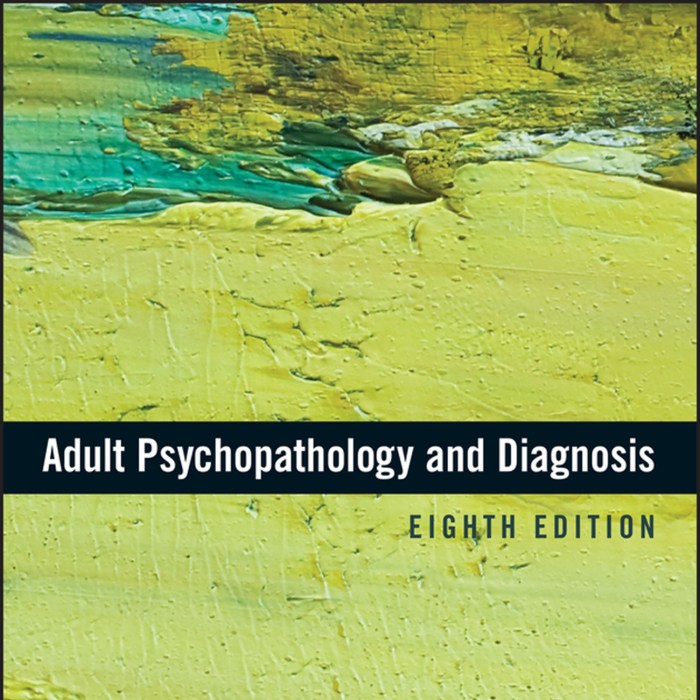Abnormal psychology: a scientist-practitioner approach deborah c. beidel pdf – Deborah C. Beidel’s “Abnormal Psychology: A Scientist-Practitioner Approach” presents a comprehensive and authoritative examination of the field, offering a unique blend of theoretical and practical insights for both students and professionals. This engaging text explores the multifaceted nature of mental disorders, their assessment and diagnosis, and the diverse treatment approaches available.
Drawing upon the latest research and clinical advancements, Beidel’s work provides a thorough understanding of the etiology, symptoms, and management of a wide range of mental health conditions. It emphasizes the importance of a biopsychosocial approach, integrating biological, psychological, and social factors to provide a holistic perspective on mental health.
1. Introduction to Abnormal Psychology

Abnormal psychology is the study of psychological disorders, which are characterized by significant distress or impairment in functioning. It has a long history, with roots in ancient Greece and the Middle Ages.
Abnormal psychology is a diverse field, with different perspectives and approaches. Some researchers focus on the biological causes of disorders, while others focus on the psychological or social factors. Some researchers use qualitative methods, such as case studies, while others use quantitative methods, such as experiments.
Different Perspectives and Approaches
- Biological perspective:Focuses on the role of genes, brain chemistry, and other biological factors in the development of disorders.
- Psychological perspective:Focuses on the role of learning, cognition, and other psychological factors in the development of disorders.
- Social perspective:Focuses on the role of social factors, such as poverty, discrimination, and trauma, in the development of disorders.
- Biopsychosocial perspective:Integrates the biological, psychological, and social perspectives, recognizing that all of these factors play a role in the development of disorders.
2. Assessment and Diagnosis in Abnormal Psychology
Assessment and diagnosis are essential components of abnormal psychology. Assessment involves gathering information about a person’s symptoms, history, and functioning. Diagnosis involves using this information to determine whether the person meets the criteria for a particular mental disorder.
Methods of Assessment
- Clinical interview:A face-to-face meeting between a clinician and a patient, during which the clinician asks questions about the patient’s symptoms, history, and functioning.
- Psychological testing:A series of standardized tests that assess a person’s cognitive abilities, personality traits, and other psychological factors.
- Behavioral observation:Observing a person’s behavior in different settings, such as at home, at work, or in social situations.
Diagnostic Systems
The most widely used diagnostic system in abnormal psychology is the Diagnostic and Statistical Manual of Mental Disorders (DSM-5), published by the American Psychiatric Association. The DSM-5 provides criteria for diagnosing mental disorders, based on symptoms, course, and other factors.
Challenges and Limitations of Diagnosis
- Reliability:The extent to which different clinicians agree on a diagnosis.
- Validity:The extent to which a diagnosis accurately reflects the presence or absence of a mental disorder.
- Cultural bias:The extent to which a diagnosis is influenced by the cultural background of the person being diagnosed.
3. Etiology of Mental Disorders

The etiology of mental disorders is complex, and there is no single cause of any disorder. However, research has identified a number of factors that contribute to the development of disorders, including:
Biological Factors
- Genes:Some mental disorders are thought to be caused by genetic factors, although the exact mechanisms are not fully understood.
- Brain chemistry:Imbalances in neurotransmitters, such as serotonin and dopamine, have been linked to a number of mental disorders.
- Brain structure:Abnormalities in the structure of the brain have been linked to some mental disorders, such as schizophrenia.
Psychological Factors
- Learning:People can learn to develop maladaptive behaviors and thought patterns that contribute to the development of disorders.
- Cognition:Distorted thinking patterns, such as negative self-talk, can contribute to the development of disorders.
- Personality traits:Certain personality traits, such as neuroticism and introversion, can increase the risk of developing disorders.
Social Factors
- Trauma:Exposure to traumatic events, such as abuse, neglect, or combat, can increase the risk of developing disorders.
- Stress:Chronic stress can contribute to the development of disorders, especially if the person does not have adequate coping mechanisms.
- Social support:Lack of social support can increase the risk of developing disorders.
Models of Psychopathology
There are a number of different models of psychopathology that attempt to explain the causes of mental disorders. One common model is the biopsychosocial model, which integrates the biological, psychological, and social factors that contribute to the development of disorders.
4. Treatment of Mental Disorders

There are a variety of different treatments for mental disorders, including psychotherapy, medication, and a combination of both. The type of treatment that is most effective depends on the individual and the disorder.
Psychotherapy
Psychotherapy is a type of treatment that involves talking to a trained therapist about your thoughts, feelings, and behaviors. There are many different types of psychotherapy, including:
- Cognitive-behavioral therapy (CBT):CBT focuses on changing negative thoughts and behaviors that contribute to disorders.
- Psychodynamic therapy:Psychodynamic therapy focuses on uncovering unconscious conflicts that contribute to disorders.
- Humanistic therapy:Humanistic therapy focuses on helping people to reach their full potential.
Medication
Medication can be an effective treatment for many mental disorders. There are a variety of different types of medication, including:
- Antidepressants:Antidepressants are used to treat depression and anxiety disorders.
- Antipsychotics:Antipsychotics are used to treat schizophrenia and other psychotic disorders.
- Mood stabilizers:Mood stabilizers are used to treat bipolar disorder.
Combination Treatment
In some cases, a combination of psychotherapy and medication is the most effective treatment for a mental disorder.
5. Special Topics in Abnormal Psychology
In addition to the general topics covered in this course, we will also explore some specific mental disorders in more detail. These disorders include:
Anxiety Disorders
- Generalized anxiety disorder (GAD):GAD is characterized by excessive worry and anxiety that is difficult to control.
- Panic disorder:Panic disorder is characterized by sudden, unexpected panic attacks.
- Phobias:Phobias are intense fears of specific objects or situations.
Mood Disorders
- Major depressive disorder (MDD):MDD is characterized by a period of at least two weeks of depressed mood and loss of interest in activities.
- Bipolar disorder:Bipolar disorder is characterized by alternating periods of mania and depression.
Personality Disorders
- Borderline personality disorder (BPD):BPD is characterized by a pattern of unstable relationships, self-harm, and impulsive behavior.
- Antisocial personality disorder (ASPD):ASPD is characterized by a lack of empathy and remorse, and a disregard for the rights of others.
6. Ethical and Legal Issues in Abnormal Psychology
Mental health professionals are bound by a number of ethical and legal guidelines. These guidelines are designed to protect the rights of patients and to ensure that they receive the best possible care.
Ethical Guidelines
- Confidentiality:Mental health professionals are required to keep the information that patients share with them confidential.
- Informed consent:Mental health professionals must obtain informed consent from patients before they provide treatment.
- Duty to warn:Mental health professionals have a duty to warn others if they believe that a patient is a danger to themselves or others.
Legal Considerations, Abnormal psychology: a scientist-practitioner approach deborah c. beidel pdf
- Malpractice:Mental health professionals can be held liable for malpractice if they fail to provide adequate care to their patients.
- Involuntary commitment:In some cases, mental health professionals can involuntarily commit a patient to a psychiatric hospital if they believe that the patient is a danger to themselves or others.
Popular Questions: Abnormal Psychology: A Scientist-practitioner Approach Deborah C. Beidel Pdf
What are the key perspectives used in abnormal psychology?
The major perspectives include the medical model, psychodynamic perspective, behavioral perspective, cognitive perspective, and humanistic perspective.
How does the DSM-5 aid in the diagnosis of mental disorders?
The Diagnostic and Statistical Manual of Mental Disorders, Fifth Edition (DSM-5) provides standardized criteria for diagnosing mental disorders, ensuring consistency and reliability in diagnosis.
What is the biopsychosocial model of psychopathology?
The biopsychosocial model suggests that mental disorders result from a complex interaction of biological, psychological, and social factors.
